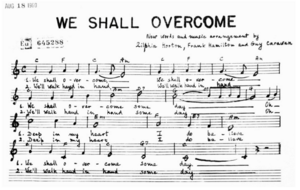Zilphia Horton facts for kids
Quick facts for kids
Zilphia Horton
|
|
|---|---|
| Born | April 14, 1910 Arkansas |
| Died | April 11, 1956 Tennessee |
| Genres | protest music |
| Occupation(s) | musician, ethnomusicologist, labor organizer, activist, teacher |
| Instruments | accordion |
| Years active | 1935–1956 |
Zilphia Horton (born April 14, 1910 – died April 11, 1956) was an American musician, community organizer, teacher, Civil Rights activist, and folklorist. A folklorist studies and collects traditional stories, songs, and customs. She is best known for her important work with her husband Myles Horton at the Highlander Folk School. There, she helped change songs like "We Shall Overcome", "We Shall Not Be Moved," and "This Little Light of Mine" from hymns into powerful protest songs for the Civil Rights Movement.
Contents
Early Life and Background
Zilphia Mae Johnson was born on April 14, 1910. Her birthplace was Spadra, Arkansas, a town known for coal mining. She was the second child of Robert Guy Johnson and Ora Ermon Howard Johnson. Her father was in charge of the local coal mine and later owned it. Her mother worked as a school teacher. Some sources say she had mixed Spanish and Native American heritage. Other sources describe her as white.
Education and Her Path
Zilphia Horton went to the College of the Ozarks, now called the University of the Ozarks. She studied classical music there. After finishing college, Horton wanted to use her musical skills to help working people in the Southern United States.
Her interest in social justice grew because of a minister named Claude C. Williams. He tried to help her father's workers form a union. Zilphia joined these efforts to organize the union. Her father did not approve of this.
Working for Change
In 1935, Zilphia attended a workshop at the Highlander Folk School. This school was in Monteagle, Tennessee. It was a place for training leaders in social justice and a cultural center. Horton arrived at Highlander Folk School believing that music and plays could help workers organize.
A few months after her first workshop, she married Myles Horton. He was the founder of the school. She then began working for the Highlander Folk School.
Her Role at Highlander
Zilphia Horton had many important jobs at Highlander Folk School. From 1938 to 1956, she was the music and drama director. She made the school's culture richer by adding folk music, dance, and plays to the lessons. She showed how important these art forms were.
She directed plays for workers. She also ran camps for young union members. She organized many community programs. Horton helped start local unions. She led singing at workshops, at picket lines (where people protest), at union meetings, and at concerts to raise money.
She had students collect different kinds of songs. These included folk songs, religious music, and union songs from all over the South. She then changed or rewrote these songs. She turned them into protest songs to be used in important political fights. This included labor movements and the Civil Rights Movement.
Zilphia Horton is perhaps most famous for teaching Pete Seeger an early version of "We Shall Overcome." This song became a very important anthem for the Civil Rights Movement in the 1900s. It was originally an old Baptist hymn called "I Will Be All Right." The song came to Highlander from the protests of the 1945–1946 Charleston Cigar Factory strike. This strike was by the CIO Food and Tobacco Workers Union in Charleston, South Carolina. Other musicians who helped change the song were Frank Hamilton, Guy Carawan, Candie Carawan, and Pete Seeger.
On April 11, 1956, Zilphia Horton passed away. She accidentally drank a glass of cleaning fluid. She thought it was water.
Her Family
Zilphia and Myles Horton had two children together.
Her Lasting Impact
Zilphia Horton's important papers are kept at the Tennessee State Library and Archives in Nashville.
A book about her life, called A Singing Army: Zilphia Horton and the Highlander Folk School by Kim Ruehl, was published in April 2021.
 | Kyle Baker |
 | Joseph Yoakum |
 | Laura Wheeler Waring |
 | Henry Ossawa Tanner |


